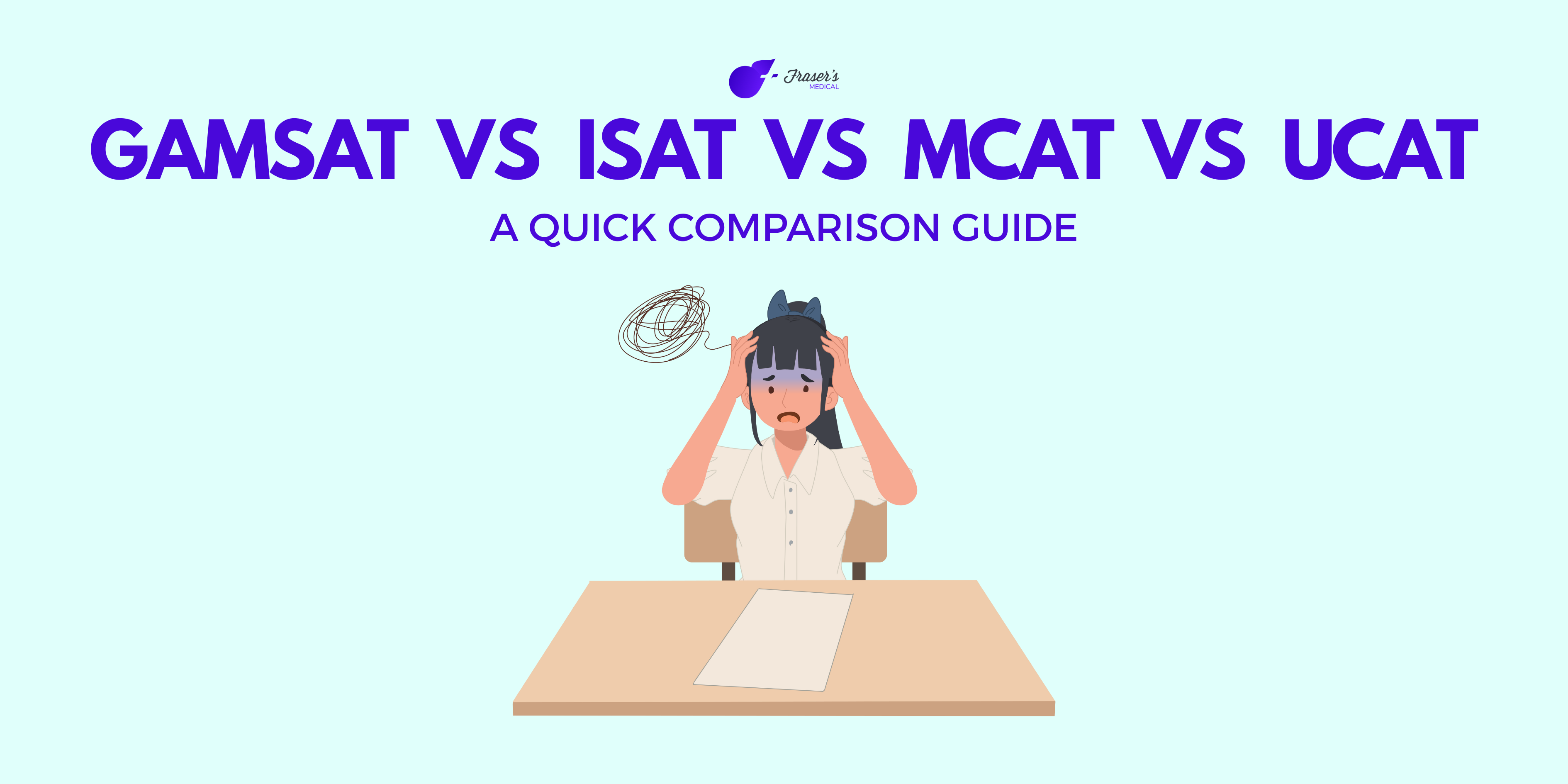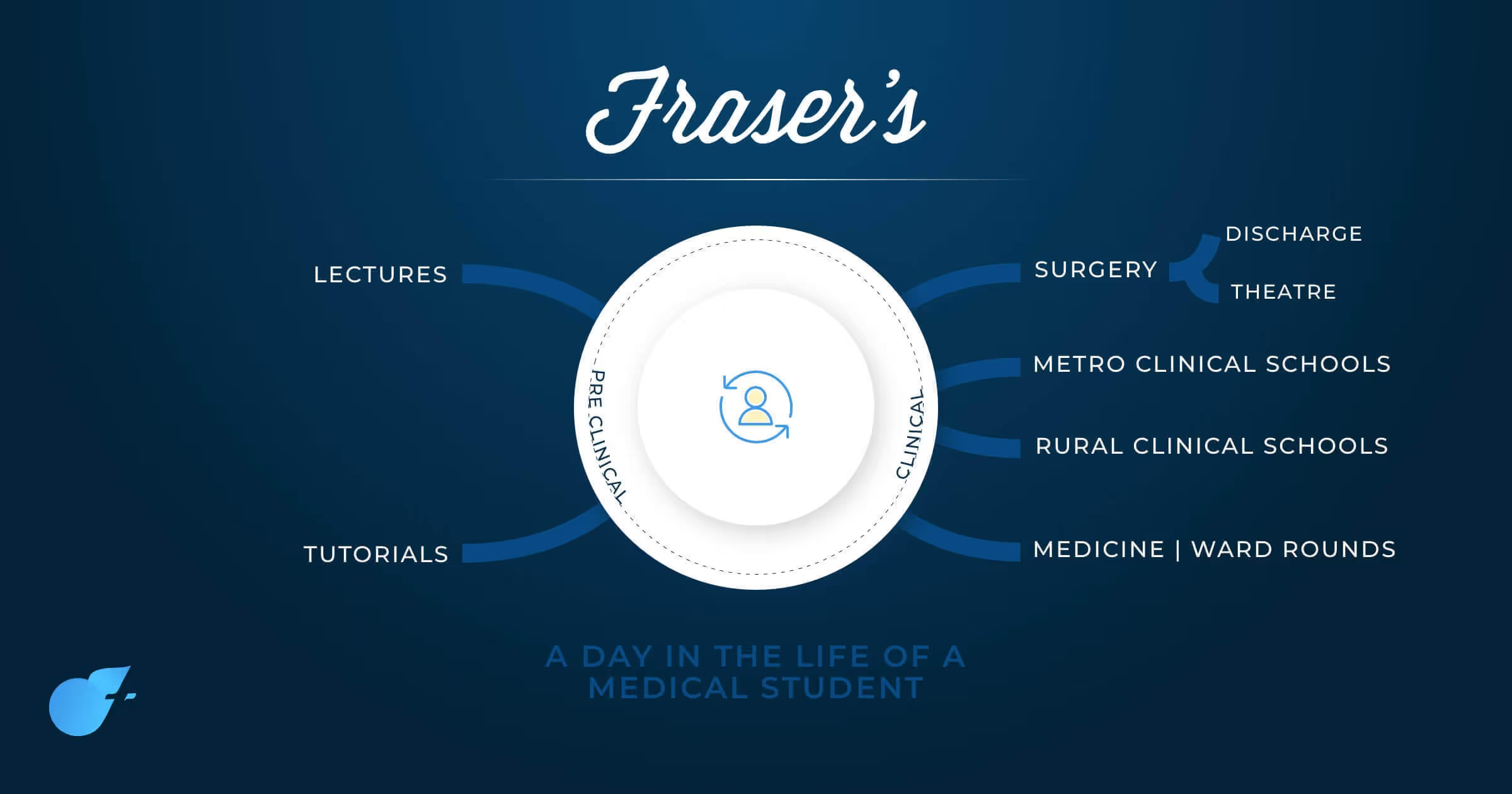Introduction
Deciding between the GAMSAT, ISAT, MCAT, and UCAT is one of the first major decisions you'll face on your journey to medical school. Each exam is designed for different applicant pathways, education levels, and regions and understanding those differences is key to making the right choice.
In this article, we'll break down each test at a high level, helping you identify which one best fits your background, strengths, and future goals.
At Fraser’s Medical, our mission is to equip you with the clarity and strategy needed to approach the proper test with confidence. Whether you're a high school student, graduate, or international applicant, this guide will help you take the next informed step toward a career in medicine.
Each test is used by different universities and is suited to various education levels and applicant categories, for instance:
What is the UCAT?
A computer-based exam, required for entry into undergraduate medicine programs in Australia, New Zealand, and the UK. This particular test focuses on cognitive aptitude and professional behaviours.
What is the ISAT?
Another computer-based exam, required for international students applying to undergraduate medicine in Australia. Please note that the ISAT it’s not structured like the UCAT. While both are aptitude-based, ISAT does not have sections like situational judgement or abstract reasoning.
What is the GAMSAT?
A standardised exam, used for graduate-entry medicine programs in Australia, Ireland, and the UK. It tests science knowledge, critical thinking, and writing skills.
What is the MCAT?
A standardised multiple-choice exam, used by medical schools in the United States and Canada for admission to graduate programs. There is a strong emphasis on science and analytical skills.
For a more detailed comparison between the UCAT and GAMSAT exams, take a look at this Fraser’s article - GAMSAT or UCAT: What is the difference?
Regardless of which pathway you choose, whether undergraduate or graduate, understanding these tests early can help you plan ahead, reduce stress, and set yourself up for success.
The best medical admissions test for you largely depends on the pathway you intend to take, your current situation, and whether you’re applying as a local student, an international applicant, or taking an overseas test. To help you navigate these options clearly, here's a breakdown of which exam may suit you based on your path:
Should I take the UCAT?
The UCAT is suitable for current Year 12 students or recent school leavers in Australia and New Zealand who are aiming to enter undergraduate medicine.
For example, a student completing their final year of high school and applying to study medicine straight after graduation would typically sit the UCAT.
Should I take the ISAT?
The ISAT is designed for international students who have completed or are in their final year of high school and wish to apply to undergraduate medical schools in Australia.
For instance, a student finishing high school overseas and applying to an Australian university for medicine may be required to sit the ISAT.
Should I take the GAMSAT?
The GAMSAT is intended for applicants who already hold a bachelor’s degree and are applying for graduate-entry medicine.
For example, a university graduate from a science, arts, or health background who wants to study medicine at the postgraduate level typically needs to take the GAMSAT.
Should I take the MCAT?
The MCAT is required by most US and Canadian medical schools and is taken by students who are completing or have completed an undergraduate degree.
For instance, someone nearing the end of their bachelor’s degree and planning to apply to medical schools in the US would likely need to sit the MCAT.
*Note: The Abstract Reasoning section has been removed from the UCAT starting in 2025 as part of a structural update to improve fairness and relevance.
UCAT, ISAT, GAMSAT and MCAT Scoring System
*Note: After the removal of Abstract Reasoning from the UCAT, the total cognitive score range went down from 1200-3200 to 900-2700. The Situational Judgement section continues to be scored separately on Band 1-4.
It’s important to note that while the UCAT and ISAT are purely skills-based and do not assess memorisation, the GAMSAT and MCAT include science components that require content knowledge.
However, all four exams ultimately emphasise the application of reasoning over rote learning.
These tests are designed to be tough, but so are you. With the right preparation plan and enough practice, you can tackle any of them with confidence.
Fraser’s Medical provides tailored preparation programs that align with the structure and demands of each test:
- UCAT: Strategy sessions, timed practice exams, and personal mentoring.
- ISAT: Targeted preparation that supports international students with adapted resources.
- GAMSAT: Science content review, essay writing workshops, and reasoning tutorials.
Frasers' approach combines expert content instruction with personalised study plans and mentoring to help students reach their target scores efficiently.



So, Which Test Should I Choose: MCAT, UCAT, GAMSAT or ISAT?
If you’re still unsure which medical school is right for you, take the Medical School Sorting Hat Quiz, created by the Fraser’s Team to find your best-fit option.
Choosing between the MCAT, UCAT, GAMSAT, or ISAT is a crucial step on your path to medical school, and the right choice depends on your goals, background, and where you plan to study. By understanding the demands of each test and aligning your preparation accordingly, you’ll set yourself up for success. No matter where you are in your journey, remember that the proper support, resources, and mindset can make all the difference.
Your future in medicine starts with a wise, informed decision, and Fraser’s Medical is here to guide you every step of the way.
Frequently Asked Questions - MCAT vs UCAT vs GAMSAT vs ISAT
1. Do all Australian universities accept the same test?
No. Different universities accept different tests:
- UCAT ANZ: Most undergraduate medical/dentistry programs
- GAMSAT: Postgraduate medicine (eg, Melbourne, Monash, University of Queensland)
- ISAT: For international students at certain undergrad programs (eg, University of New South Wales, Monash)
- MCAT: Limited postgrad med programs in Australia (eg, University of Sydney), mostly used for US med schools
2. Can I take more than one of these tests?
Yes. If you're applying to multiple programs, you may need to take more than one test (eg, UCAT for undergraduate medicine in Australia and ISAT for international students). Make sure your test choices align with your university preferences.
3. What is the hardest medical entry exam?
All tests are challenging in different ways:
- UCAT is fast-paced and time-pressured.
- GAMSAT and MCAT are long, content-heavy exams with strong science requirements.
- ISAT is logic-based and easier to prepare for in a short time, but still competitive
4. Do I need tutoring for these tests?
Not necessarily, but having guidance and a tutor can significantly boost your confidence and the way you approach the tests, especially for time management, essay writing and science review. Consider Fraser’s Medical if you’re aiming for top-tier programs or struggling with preparation on your own.







